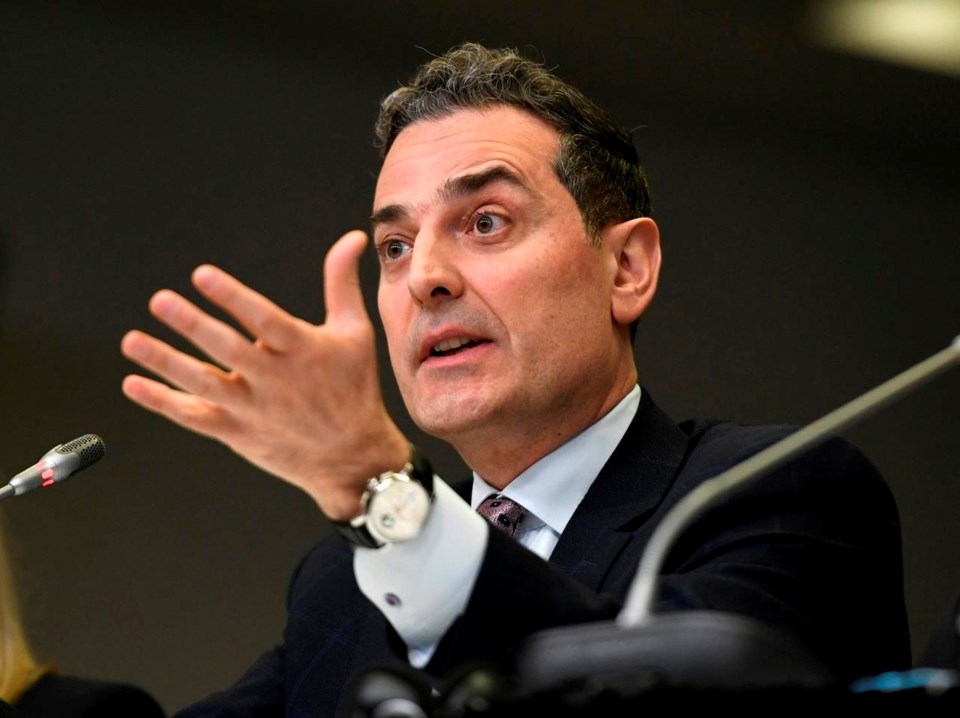TORONTO — Bell Canada president and CEO Mirko Bibic warned Monday that increased regulation in Canada's telecommunications industry could prompt companies to scale back investment and make cuts to service for underserved communities.
Speaking at a lunch hosted by Canadian Club Toronto, Bibic took aim at the federal government and Canadian Radio-television and Telecommunications Commission for a shift "towards more micromanagement of Canada's telecom industry."
He said some investments are "impossible to justify" when big companies are required to provide smaller competitors access to their privately built networks at heavily discounted rates.
"Our industry is quite highly regulated and we appear to be moving rapidly towards even more intervention," said Bibic, adding that such an approach "generates market uncertainty."
"Our regulator's telling us that we have to give access to the new networks that our people, our partners and our capital are building and they're telling us the rates we have to charge for that access. That's not how a competitive market should be regulated. (It) certainly doesn't strengthen the quality or resiliency of the networks and services you all rely on."
In March, Canada's telecommunications regulator announced it would lower some wholesale internet rates by 10 per cent and review whether big companies should provide smaller competitors access to their fibre-to-the-home networks.
The CRTC said the move was aimed at improving internet speeds and bolstering competition.
That came after federal Industry Minister François-Philippe Champagne directed the regulator to implement new rules to enhance consumer rights, affordability, competition and universal access, which included a requirement for improved wholesale internet rates.
The CRTC also stated earlier this month that major telecoms would have 90 days to negotiate access agreements for mobile virtual network operators (MVNOs). That followed a policy set in 2021 allowing regional cellphone providers to compete as MVNOs across Canada using networks built by large companies.
But Bibic urged Ottawa and the CRTC to ensure Canada's four major telecom companies have incentives to invest and differentiate themselves from each other, which he said would lead to more customer value. He warned of "unintended consequences" if regulation continues to ramp up.
"There comes a point where if government is too interventionist, all of us are going to have to scale back those investments, which is not good for consumers and businesses," he said.
"If you've got to start cutting back on capital, what gets cut first? Does the GTA get cut first? Or does some northern community in Ontario get cut first? We know the answer to that."
In a note earlier this month, RBC analyst Drew McReynolds said that while the "regulatory temperature is rising" in the telecom sector, "for the national operators the regulatory pendulum does not appear to have swung too far in favour of regional operators."
Bibic also pushed back against a "prevailing but false narrative" surrounding the state of competition in Canada's telecom industry, as well as cellphone and internet prices.
A report released in February by Wall Communications Inc., which conducts an annual comparison of Canadian phone and internet prices to other jurisdictions, found Canada still had among the highest prices internationally for cellphone and broadband service in 2022.
But Bibic noted that despite rising inflation, wireless prices in Canada have declined eight per cent over the past two years and almost 25 per cent since January 2020.
"We've all been in the U.S. right? The service is terrible. So there is a quality dimension to it," he told the crowd.
"Too often, the prevailing narrative is based on these studies that by definition create these average baskets of goods so that there's some semblance of trying to compare prices across the world, but the baskets of goods don't actually reflect what people are buying today."
Meanwhile, the Bell CEO also addressed his company’s ongoing plea for access to Rogers Communications Inc.’s recently acquired cellular network on the Toronto subway.
In late April, Champagne penned a letter calling on major carriers to reach a deal that would allow any company to access the network after Rogers’ purchase of the existing operations. The companies were given 30 days to respond detailing their respective statuses on the issue and outline a joint plan.
Bibic said "nothing's happened" since the minister's letter and Bell hasn't received a response from Rogers to a list of questions it sent.
Bell has said it would only take part in the network if it has a chance to help build it with the other carriers, as opposed to paying Rogers a fee for access.
"The question is why won't Rogers indicate that it will let others sign on? Will it or won't it? If so, what will be the terms? When?" Bibic said.
"The minister's now kind of weighed in. He ought to finish the job and mandate access."
In a statement, Rogers spokesman Cam Gordon said the company has publicly committed to making the network accessible to all TTC subway riders regardless of their carrier from the outset and has proposed a framework for reaching agreements with its rivals "under commercially reasonable terms."
"Bell continues to make inaccurate statements about our partnership with the TTC and our efforts to make wireless connectivity accessible for all TTC subway riders, regardless of their carrier," he said in a statement.
"In the meantime, 9-1-1 services continue to be available for all TTC riders on the existing legacy network, and we’re committed to expanding the availability of 9-1-1 and working to add 9-8-8 service for all riders as soon as it becomes available."
This report by The Canadian Press was first published May 29, 2023.
Companies in this story: (TSX:BCE, RCI.B)
Sammy Hudes, The Canadian Press




